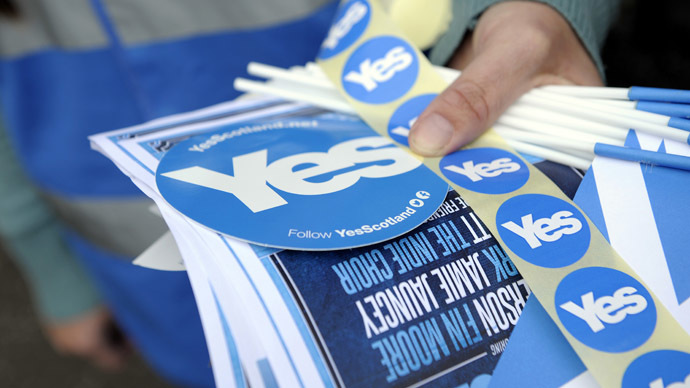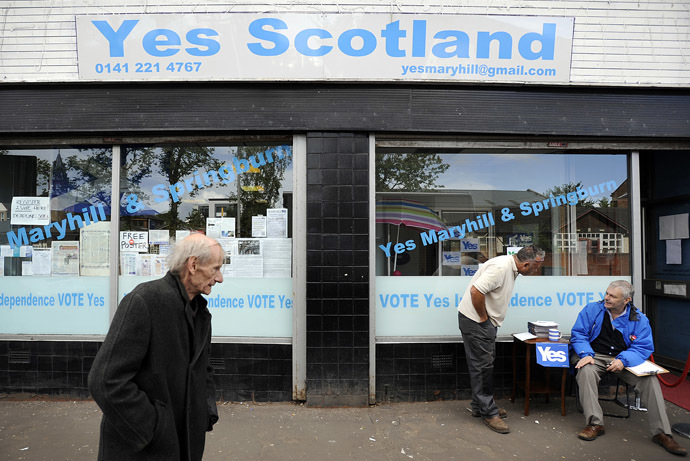Ireland needed guns, but Scots only need a pen for independence

Support for Scottish independence has risen eight percentage points in a month, and momentum is firmly in its favor. Have the Scots now got the desire to become a nation once again?
It whisper'd too, that freedom's ark
And service high and holy,
Would be profaned by feelings dark
And passions vain or lowly;
For, Freedom comes from God's right hand,
And needs a Godly train;
And righteous men must make our land
A Nation once again!
- Thomas Davis, A Nation Once Again.
“A bheil Gàidhlig agaibh? Alba, táim in nGrá leát.” Only about 90,000 people will understand that question, or about two percent of the Scottish population, but the considerably larger (close to 2 million) number of Irish speakers will get the gist. It means, in English: “Can you speak Scottish? Scotland, I love you.”
I freely admit to a weakness for Scotland and while I can’t speak Scottish I think that I do understand most of the language. The problem has always been trying to find Scots who are sufficiently proficient to test that theory. Centuries of London rule have banished the tongue to the extreme margins and speakers are very hard to find.
The Scotland I adore is the land where Robert Burns wanted to love his “bonnie lass… till all the seas gang dry.” A place of pipe bands, tartan, highland dancing and shinty – from where my forefathers departed for Ireland for reasons I do not know.
Amid all the adulation of its culture and its unique people, the obstacle to true, unconditional love has always been its curious willingness to remain inside the United Kingdom, ruled from London and unable to make its own choices. For an Irishman, raised on tales of heroic - often foolhardy - strikes for freedom, this is almost impossible to fathom. Is it not better to make your own mistakes and stand by them without having failures imposed by others? Conversely, are glories not sweeter when they are created by thine own hand?
Ireland fought for centuries to remove English rule - in 1798 alone, anywhere up to 50,000 died in a failed rebellion and there were at least a dozen more attempts, all of which ended in disaster. Then, in 1916, an insurrection began, to be followed by a democratically legitimate brutal guerrilla war which led to formal independence for most of the island in 1922. The Ulster conflict - which wasn't approved through the ballot box - only officially concluded in 1998 and still simmers, with sporadic violent events a sad fact of life. The political status of what is known as Northern Ireland remains unresolved with Nationalist factions working towards reunification with the Irish Republic and Unionists clinging onto the province’s status within the UK.

The Nobel laureate W.B. Yeats called these struggles the ‘delirium of the brave’ and Scotland also had centuries of hostilities, but the last major uprising was defeated at the Battle of Culloden in 1745 – and that was more about restoring a Catholic Monarchy in Britain than Scottish independence. Following that setback, while Ireland plunged into almost a century and a half of more-or-less continuous war, Scotland focused on harnessing the fruits of empire and economic progress.
As the 19th century passed, Scotland became closer to England and the UK became established as the world’s foremost power. By 1900, the British Empire stretched over two-thirds of the globe and, as most of Ireland departed the union, the remainder was solidified by the shared struggle of the Great War and, even more-so, during the Second World War. That conflict was arguably the high-water mark of British togetherness as the island rallied around Winston Churchill’s fiery leadership and the joint cause of repelling Nazi Germany. In the post-war years, the empire dissolved, rule Britannia rang hollow and it has been largely downhill since.
Scottish nationalist movements were active during the war years, yet deeply unpopular due to a perception that they were sabotaging the patriotic struggle against Hitler. However, once the fog of war lifted, their first political breakthrough came in 1945 when Robert McIntyre won a Westminster seat in a Motherwell bye-election. The strength of the SNP movement continued to grow and by 1974 they achieved almost a third of the vote. That success proved a false dawn as support slipped five years later.
Then, Scotland’s nationalists received their biggest ever boost – Margaret Thatcher. To say Thatcher was disliked in most of Scotland is like suggesting cats aren't fond of being splashed with water, it’s a serious understatement registering at 11 on a scale of 1-10. In 1979, her Conservative and Unionist party managed 31 percent of the vote north of the River Tweed, but after 11 years of ‘Maggie’ and almost 7 with her successor, John Major, they limped to 17 percent in 1997. The numbers are even lower now.
The Labour Party won that national election and, under Edinburgh-born Tony Blair, they introduced a Scottish parliament, with devolved powers, two years later. Though largely unforeseen at the time, it would lead to a rapid escalation in separatist feeling as Scotland became a bastion of left politics and England drifted further right. While their southern neighbor became more and more enamored with globalization, with London as its engine, Scots became focused on local issues and identity. The sons of Caledonia in the UK government grew ever more distant from their fellow countrymen as they espoused a ‘Britishness’ that was more resonant in England than at home. This reached its apex while ‘son of the Manse’ Gordon Brown was the steward of 10 Downing Street and spent so much time talking about being ‘British’ that he largely alienated his kith and kin.
While Scotland’s big political beasts were strutting around London and the world, Alex Salmond’s SNP were playing a different game, openly talking of independence and calling for a referendum. In 1999, they achieved a mere 28 percent of the Holyrood vote, but by 2007 they were the biggest party and in 2011, they scored 45 percent and took an overall majority in the Edinburgh parliament. Independence was no longer a pipe-dream; it was now a live prospect.
When David Cameron’s UK government agreed to a referendum in March 2013, support for separation languished at 33 percent and talk of a ‘Yes’ vote seemed fanciful. Today it stands at 47 percent, according to YouGov pollsters and, with the momentum firmly behind an aye, it looks increasingly possible that in a few short weeks, Scotland will decide to leave the United Kingdom. With that, a country, which a century ago ruled most of the world, will be no more.

Predictably, the Western political establishment is dead against it, with leaders from President Obama to inconsequential Eurocrats to Australia’s Tony Abbot interfering. This makes it even more of a good thing, in my view, because if they are opposed to it they probably fear it. It's also deeply ironic that the loudest opposition voices come from former British colonies, akin to enjoying the champagne while suggesting Scotland sticks to grog.
There have been threats to exclude Scotland from the EU, a ridiculous notion when Brussels desperately needs more ‘rich’ members to balance the poor east. Anyway, take it from me, Ireland will make sure you are accepted into the EU – you can bet your bottom dollar, or pound, when the English threat to withdraw it proves hyperbole. There is no way Dublin would countenance their natural Scots allies locked outside.
Just think about what independence would mean? Instead of the Union Jack, the saltire will fly over Scottish institutions worldwide, a Scottish seat would be prepared at the United Nations and passports would bear its name. Edinburgh would become home to the world’s second sovereign Celtic parliament (after Dublin) and Scottish folk could eye other around the world as equals, no longer 'servile' as Irvine Welsh depicted. The trappings of statehood would quickly follow, Edinburgh would become an international capital, with full embassies, not consulates, dotted around it and new national symbols and artistic bodies would flourish – the iconography of independence. At the next Olympic Games, when a Scots athlete takes gold, Flower of Scotland would replace God Save The Queen as they step up to the medals podium. As an Irishman, I wonder how any of my Celtic cousins wouldn’t want that.
For Scots afraid to take the plunge, I have this to propose: Take the short trip to Dublin and ask one random person on the street: “Should Ireland rejoin the UK?” After they had finished laughing at you, they’d probably suggest medical help of some sort. It’s a thought so crazy that, no matter what economic troubles (and we’ve had a few) prevail, it is never so much as suggested in Ireland, and if anyone was brave or stupid enough to advocate it they’d be looked at with both amazement and ridicule.
Our sovereignty makes us what we are. It unites Irish people, even those scattered around the planet, as one, single idea and it defines us. Through the zeniths and nadirs, we all know that we have a home, which we govern ourselves, that we can return to or happily stay in, no matter what. It goes beyond money or other fleeting factors – it’s about identity and a sense of place.
On Thursday September 18, Scotland has a chance to do with the stroke of pens what Ireland had to force through the barrel of a gun: a chance to be a nation once again.
Please, friends, say yes, or aye or gu dearbh or whatever way you wish, just make it affirmative and, I promise, you will never regret it.
“So, as I grew from boy to man,
I bent me to that bidding
My spirit of each selfish plan
And cruel passion ridding;
For, thus I hoped some day to aid,
Oh, can such hope be vain?
When my dear country shall be made
A Nation once again!”
The statements, views and opinions expressed in this column are solely those of the author and do not necessarily represent those of RT.
The statements, views and opinions expressed in this column are solely those of the author and do not necessarily represent those of RT.













